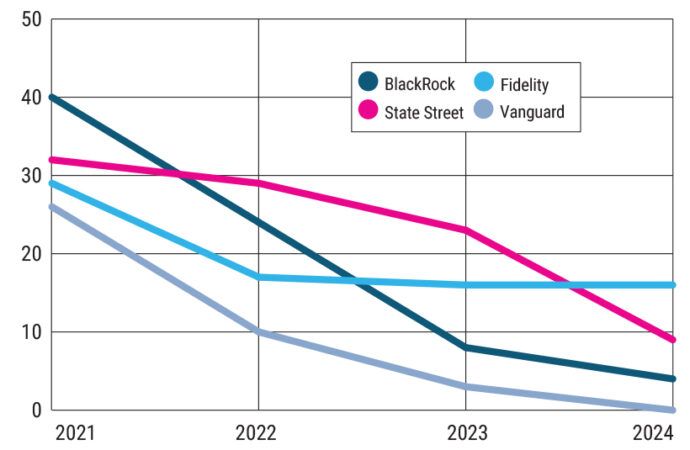On 10 January 2025, Blackrock announced its withdrawal from the Net Zero Asset Managers’ initiative (NZAM). Three days later, NZAM suspended itself, pending a review. Both decisions followed a letter from the US House Judiciary Committee in December to over 60 asset manager members of NZAM. It accused them of operating a “woke ESG cartel” by facilitating collusive action to promote “radical environmental, social and governance goals on American companies”.
Also watch: Evenlode’s Sawan Wadhwa: ‘It’s a good time for NZAM to review itself’
As we are witnessing across many industries, the ripple effects from President Trump’s return to the White House are global. In asset management, proclamations of sustainability or net zero are being scrubbed from marketing material with little sign of regret. To some, it seems sustainability was a convenient pastime that has run its course. This begs the question, are asset managers quietly abandoning efforts to promote enduring economic prosperity by supporting action on climate change, biodiversity, or effective and accountable boards, because they fear unwanted scrutiny from anti-woke campaigners?
There is evidence suggesting that the pullback from ESG commitments is more than cosmetic. According to ShareAction’s latest review of asset managers’ voting in 2024, support for shareholder resolutions on environmental and social issues hit an all-time low. Just 1.4% of resolutions received majority support compared with almost 25% in 2021. The shift is starkest among the four largest managers – Blackrock, State Street, Vanguard, and Fidelity (see chart). Together these managers accounted for an average 17% of the reviewed companies’ shareholder base. They have the power to make a difference through their voting.
Support for environmental and social resolutions among the four largest asset managers

The fundamental forces are unchanged
The fundamental forces shaping our lives have not changed; if anything, they are getting worse. As such, an approach of short-term self-preservation risks sowing the seeds of long-term client harm.
Climate change is accelerating. In January, the World Meteorological Organisation confirmed that we have breached the safety threshold of 1.5°C above pre-industrial times over the past year. Scientists at the Intergovernmental Panel on Climate Change are unequivocal in outlining the dangers: unabated climate change is likely to have dire consequences for humanity.
The World Wildlife Fund’s latest report on biodiversity is equally alarming. Between 1970-2020, the average size of monitored wildlife populations shrank by 73%. Habitat degradation and loss, exacerbated by climate change, are raising the risk of irreversible tipping points.
Turning to social trends, polarisation and mental health problems are rising as technology increasingly shapes our lives. For example, in 2024, the World Health Organisation underlined growing evidence of mental health consequences for children. While there are benefits of connectivity and digital tools, the dangers increase when we are not alert to the risks.
As for governance, the breakdown of established norms is eroding trust and raising the risk of conflict – not just between nation states but also between companies and their shareholders. A striking example was ExxonMobil’s suing its shareholder Arjuna Capital last year for filing a shareholder resolution on net zero alignment. The chilling effect on shareholder engagement has been palpable.
Short-term gain but long-term pain
The problem is that turning a blind eye to these trends may feel liberating in the short term. As investors roll back scrutiny, corporates feel emboldened to dial back their own environmental or social commitments. What began in the US is now spreading to Europe and beyond as investors and corporates appear increasingly in lockstep – either abandoning core sustainability commitments or going silent.
Also read: US DEI rollbacks ‘likely to have meaningful impact in Europe’
In some ways the European playbook is worse, many companies continue to promise sustainability, while providing false comfort and cover for inaction.
ExxonMobil may have gone further than peers in suing a shareholder, but European majors have hardly held the line on sustainability. Some big names have been accused of weakening climate targets under the guise of remaining competitive. Unilever, one of the largest global users of plastics, has delayed its goals – reducing virgin plastic use by 30% by 2026 instead of 50% by 2025. Following the exit of US banks from the Net Zero Banking Alliance, HSBC announced in February it was abandoning its 2030 net zero operational target.
Stewardship suffers in silence
The post-war political order is breaking, and we do not yet know if, or where, a new equilibrium will be established. However, the future does not just happen to us – it is shaped by us. As investors, we have a key role and responsibility to act in ways that serve our clients’ long-term interests. That will not be achieved by ignoring major social and environmental trends or neglecting good governance. Investing in a way that supports society offers the best path to long-term financial performance and better outcomes for our clients. As we see peers stepping away from stewardship, we remain committed to speaking out on the issues that matter.








